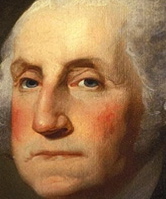Source: Consortium News

Typically, the week of Presidents' Day brings out lists of the best and worst U.S. presidents based on how they're viewed by the general public or by mainstream historians, but often those rankings simply measure popularity or repeat conventional wisdom. The presidents get rated based on what "everyone" thinks rather than their real impact.
Official U.S. history also has been systematically distorted by an entrenched racism that has minimized responsibility of some early presidents for building the ideological framework that rationalized the enslavement of African-Americans and the genocide of Native Americans. Only slowly has some of that bias been squeezed out, but it still pervades the typical textbook.
And, as part of the Republic's early struggle over slavery was the battle to reinterpret the Constitution, which was drafted by the Federalists to make the national government "supreme" over the states and responsible to "provide for " the general Welfare." But many Southern slaveholders saw the broad federal powers as an eventual threat to slavery so -- after failing to block ratification -- they turned to simply reinterpreting the document's clear language.
Thus, "states' rights" and a "strict constructionist" view of federal power derived from the interests of slavery from the beginning of the Republic. The same notions later justified racial segregation and were embraced by laissez-faire capitalists who wanted no federal constraints on their exploitation of labor and despoliation of the environment.
The damage that these concepts did to the American people -- both black and white -- was vast. Beyond the barbarity of slavery (and Jim Crow laws) for blacks, working whites suffered from low wages and from the boom-and-bust economic cycles of unregulated capitalism in the Nineteenth, Twentieth and, indeed, Twenty-first centuries.
So, in rating the top and bottom presidents, I believe their roles in fulfilling or blocking the constitutional mandate of a national government to "provide for ... the general Welfare" should be a key factor. Those who set the United States on a course for greater well-being for the majority of the people should score higher, and those who inflicted unnecessary suffering and misery should be held accountable.
Rather than counting down the top and bottom numerical -- the usual style -- my approach will be to cite the five or so presidents who did best by the country, in my opinion, and the five who did the worst, listing them in chronological order.
One of the Best: George Washington
Though Washington is regularly included on the list of great presidents, he is often given faint praise for his actual service as the nation's first chief executive under the Constitution. That may reflect the lingering hostility toward the Federalists who principally drafted the Constitution, got it ratified and structured the early government.
Though the Federalists made their share of mistakes and can be fairly criticized for elitism, one of the chief reasons why they have been disparaged in U.S. history was their general opposition to slavery (as reflected most clearly in the abolitionist sentiments of Treasury Secretary Alexander Hamilton) and their belief in a strong and activist central government.
That put them on the outs with the powerful (and politically victorious) backlash in the 1790s and early 1800s to redefine the Constitution away from its original intent of a powerful federal government, toward a system more supportive of states' rights and thus more tolerant of the South's slave interests.
Though a Virginian and a slaveholder, George Washington gained a sense of the new nation from his service as the commander-in-chief of the Continental Army which brought together Americans across all geographic, cultural and racial lines. Washington, like other officers in the Continental Army, became the first true Americans in the sense of seeing the diverse 13 colonies/states as one nation.
From his military post, Washington also understood how unworkable were the Articles of Confederation, which made the 13 states "sovereign" and "independent" and thus inept at supporting a national effort such as the Revolutionary War and the establishment of a functioning republic in the first years after the conflict ended.
The failure of this "states' rights" concept led Washington and other Federalists to convene the Constitutional Convention in Philadelphia in 1787. They scrapped the old system entirely and replaced it with a structure that eliminated the idea of state sovereignty and declared a national sovereignty based on "We the People of the United States."
This Constitution's centralizing of government power was recognized by both supporters and opponents at the time and explains the fierce opposition from defenders of the old decentralized system. Though the Constitution implicitly accepted slavery -- as a necessary compromise to bring in the Southern states -- key defenders of slavery warned that the combination of central authority and Northern abolitionism would eventually lead to slavery's eradication, or as Virginia's Patrick Henry colorfully put it, "they'll free your niggers!"
As the first U.S. President under the Constitution, it fell to Washington to build the new government virtually from scratch, and he delegated much of that responsibility to his Revolutionary War aide-de-camp Alexander Hamilton, who was named Treasury Secretary. Since there were only three Cabinet members at the time (the others being the secretaries of war and state), Hamilton had a nearly blank slate to sketch the new government's structure.
Next Page 1 | 2 | 3 | 4 | 5 | 6 | 7
(Note: You can view every article as one long page if you sign up as an Advocate Member, or higher).





